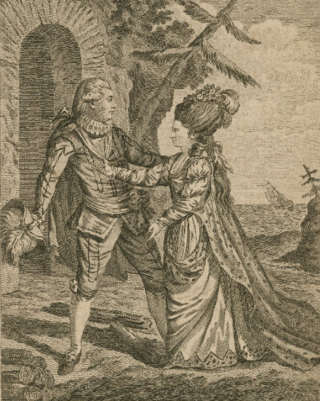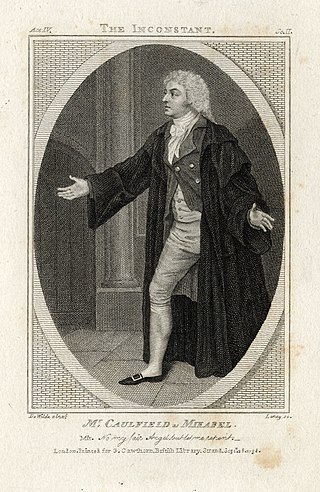Related Research Articles

John Fawcett was an English actor and playwright.
Christopher Bullock (1690–1722) was a British stage actor and dramatist.
Henry Giffard was a British stage actor and theatre manager.

George Mattocks (1735–1804) was a British stage actor and singer.
Thomas Barry was an Irish stage actor and theatre manager.
John Whitfield (1752–1814) was a British stage actor.
Mary Whitfield was a British stage actress.
James Fearon (1746–1789) was a British stage actor.
John Young was an English stage actor of the seventeenth century. He was active as a member of the Duke's Company during the Restoration Era, appearing at Lincoln's Inn Fields and then at the Dorset Garden Theatre when the company relocated. While not much is known about his background, he was repeatedly in debt during his acting career. In 1667 he stood in for Thomas Betterton after he fell ill during the run of Macbeth appearing as the title role. Samuel Pepys described him as "a bad actor at best".

Henry Harris was an English stage actor and theatre manager. Initially a painter he was a founder member of the new Duke's Company in 1660 following the Restoration which established itself at the old Salisbury Court Theatre before moving to the new Lincoln's Inn Fields Theatre shortly afterwards. Due to his background Harris may have been a set designer and painter during his early years with the company. However, by 1661 he was acting, and his first recorded role was in William Davenant's The Siege of Rhodes that summer. He quickly established himself as the second actor in the troupe after Thomas Betterton.
Michael Atkins (1747-1812) was an English-born Irish actor and theatre manager. He has been described as "the single most important person in the early history of theatre in Belfast.

Thomas Caulfield (1766–1815) was a British stage actor who after a period in London's West End spent the later part of his career in the United States.

Nannette Johnston was a British stage actress and dancer active during the Regency era. She was born in London as the daughter the actor William Parker, but educated in Edinburgh where her father was working and began her career as a dancer. In 1796 she married the actor Henry Erskine Johnston, with whom she had six children, and the then went to Dublin for a season before heading to London where she acted at Covent Garden and the Haymarket. They both moved to Drury Lane for two seasons, before returning to Covent Garden.
John Waddy (1751–1814) was an Irish stage actor and theatre manager. Originally, intended for a career in law, he was acting at Dublin's Smock Alley Theatre by 1774, combining this with appearances at Irish and English provincial theatres. From 1782 to 1796, he was a regular at the Theatre Royal, Norwich. He was then engaged by the Theatre Royal, Covent Garden in London making his debut there on 5 October 1796, under the management of Thomas Harris. He acted there and at Haymarket over the next decade and a half. He particularly specialised in playing Stage Irishman and also took over many roles when John Quick left Covent Garden. His second wife, billed as Mrs. Waddy, acted with him in London for several years. He departed from the Covent Garden company in 1810, and worked for a while at the Surrey Theatre south of the River Thames. He died in Oakingham in Berkshire on 12 April 1814.

William Chapman was a British stage actor active in the late eighteenth century and early nineteenth century. Considerable uncertainly exists about his early biography, but he became an established performer in London's West End at the major theatres Covent Garden, Drury Lane and Haymarket. Considerable crossover may exist with other actors of the era named Chapman.
Edward Evans Townsend (1766–1809) was a Welsh stage actor and singer. After making his reputation as a touring actor in Yorkshire, notably at Hull under the management of Tate Wilkinson, he was at the Theatre Royal, Norwich in the early 1790s. He also appeared in Ireland at the Crow Street Theatre and the Theatre Royal, Cork.

Charlotte Jane Chapman (1762–1805) was an American-born British stage actress. Her father was ruined during the American War of Independence and sent his daughter to live with relatives in England. Her early roles on stage came in York, where she married an actor named Morton and briefly acted under that name before separating from him and returning to her maid name. She appeared at the Theatre Royal, Margate in the summer of 1788 and was then hired by the manager Thomas Harris to joined the company of the Theatre Royal, Covent Garden in London. She remained with the company until 1804, becoming a major member of troupe known generally for her roles in comedies. She interspersed this with summer appearances at other theates including in Margate, Ireland and the Haymarket. She was buried at St Paul's in Covent Garden, known for its association with actor. She was painted twice by the artist Samuel De Wilde.
Walter Maddocks was an English stage actor and singer. He was born in Chester and was originally a schoolmaster before becoming a professional actor in the provinces appearing at the Theatre Royal, Norwich and elsewhere before he arrived at the Theatre Royal, Drury Lane in 1789. He remained with the Drury Lane company for three decades, playing supporting roles in a wide variety of productions. His wife, billed as Mrs Maddocks, appeared alongside him in provincial theatre and at Drury Lane. His surname is sometimes written as Maddox or Mattocks.
Richard Wilson (1744–1796) was an English stage actor. He was born in Durham. After featuring in provincial theatre in Northern England and Scotland he appeared as King Lear at the Theatre Royal, Edinburgh in 1772, gaining a reputation thereafter for performing in comedies. In 1775 he joined the company of the Theatre Royal, Covent Garden in London and performed there and at the Haymarket on and off for the remainder of his career. In 1795 he was imprisoned for debt at the King's Bench Prison in Southwark and died the following year. His wife was the actress Sarah Maria Wilson.

Elizabeth Heard was an English stage actress. She was born in London the daughter of William Heard, a physician and playwright, and his wife Ann Heard, an actress. Elizabeth made her stage debut at the Theatre Royal, Drury Lane as a child actor in 1782, where he mother was employed. She often played young male roles such as the Duke of York in Richard III and Prince Arthur in King John. As well as appearing as a member of the company at Drury Lane, she also began summer stints at the Haymarket from 1789 gradually playing more mature and important roles. In 1801 she left the Drury Lane company and later acted in Newcastle.